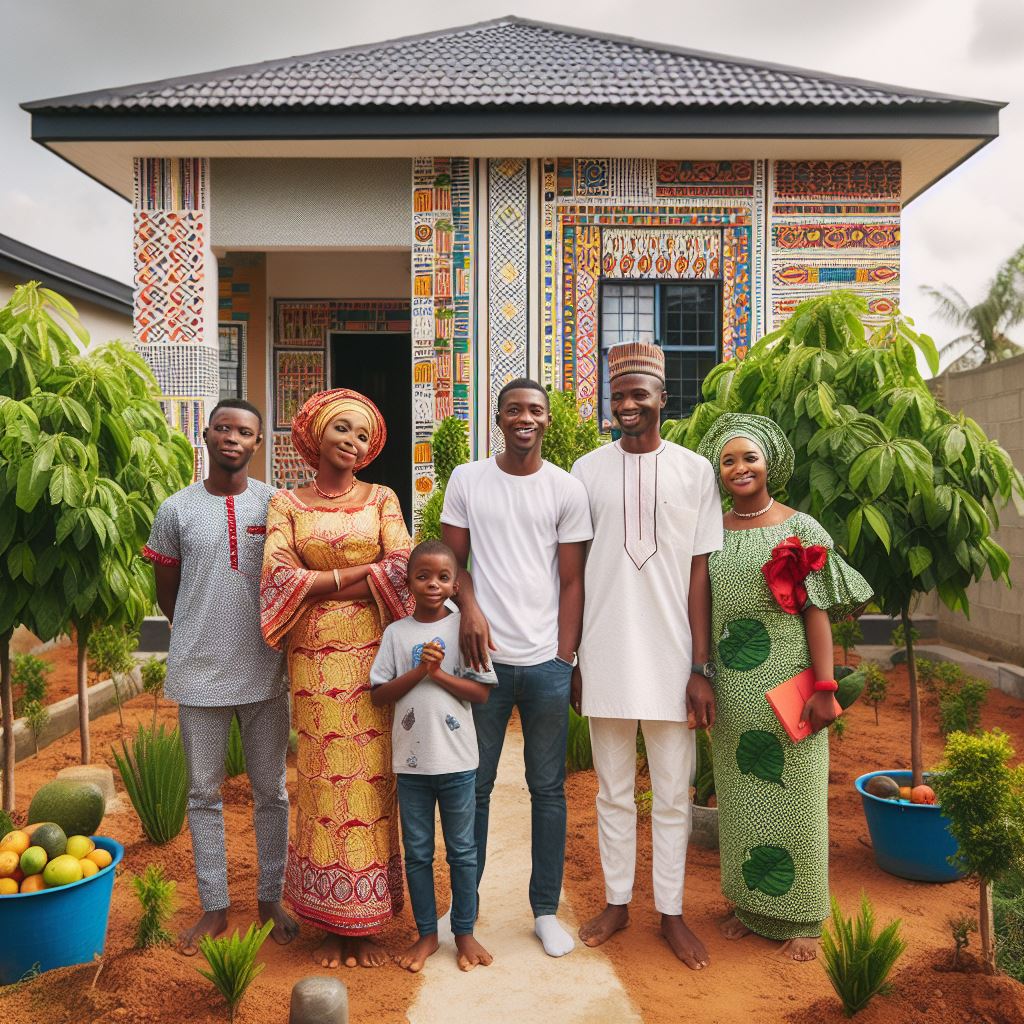Introduction
In Nigeria, the decision to rent or own property is of utmost importance for individuals seeking financial stability.
The right choice can have a significant impact on long-term financial health.
This blog post will explore the advantages and disadvantages of renting and owning property in Nigeria, allowing readers to make an informed decision.
Renting a property in Nigeria offers flexibility and freedom. It allows individuals to easily change locations and adapt to different circumstances.
Renting is also beneficial for those who do not have the financial means to purchase a property upfront.
However, renting can be costly in the long run as monthly payments are never an investment and do not contribute to personal equity.
On the other hand, owning a property in Nigeria provides stability and a sense of belonging.
Homeownership allows individuals to build equity and enjoy the potential appreciation of their property over time.
Additionally, homeowners have the freedom to customize their living space according to their preferences.
However, owning a property also comes with responsibilities such as maintenance costs, property taxes, and the inability to easily relocate.
In this blog post, we will delve into a comprehensive analysis of the Nigerian real estate market, rental trends, property prices, and financing options.
By understanding the pros and cons of renting and owning, readers will be equipped to make an informed decision based on their financial goals and circumstances.
Ultimately, whether one chooses to rent or own, careful consideration and planning are essential for a secure financial future.
Renting in Nigeria
The Concept of Renting and Its Benefits
Renting, an increasingly popular housing choice in Nigeria, offers a flexible alternative to the traditional path of homeownership.
In this section, we delve into the intricacies of renting, understanding its dynamics and the benefits it brings to individuals navigating the Nigerian real estate landscape.
Your Personalized Financial Plan
Get expert financial advice tailored exclusively to your goals. Receive a custom roadmap in just 1-3 business days.
Get StartedThe Rental Market in Nigeria: Costs and Trends
Navigating the rental market in Nigeria requires a keen awareness of average costs and emerging trends.
Currently, rental prices vary across regions, with urban centers commanding higher rates.
Keeping abreast of these trends is crucial for anyone contemplating the renting option.
Advantages of Renting in Nigeria
Flexibility emerges as a key advantage in the realm of renting.
In a dynamic economy like Nigeria’s, where job opportunities may beckon from various corners, the ability to relocate without the burden of property ownership is a liberating prospect.
Lower upfront costs also make renting an attractive choice, especially for those seeking to conserve capital or prioritize other investments.
Drawbacks of Renting: Limited Control and Landlord Dependency
Despite its advantages, renting does come with its own set of challenges.
One notable drawback is the limited control tenants have over the property.
While this might suit those seeking a hassle-free living arrangement, it can be a hindrance for those who wish to personalize or make structural changes to their homes.
Additionally, dependency on landlords for maintenance and repairs can sometimes lead to delays, impacting the quality of living.
In short, renting in Nigeria presents a compelling option for those who value flexibility, cost-effectiveness, and freedom from the responsibilities of property ownership.
However, potential tenants must weigh these benefits against the challenges, ensuring that the choice aligns with their lifestyle and long-term goals in the ever-evolving Nigerian real estate landscape.
Read: Nigerian Housing: Rent or Buy for Savings?
Owning in Nigeria
Property Ownership and its Significance
Property ownership in Nigeria holds significant cultural, social, and financial importance.
Unlock a Debt-Free Future with Our Unique Strategies
Imagine a life unburdened by debt—a reality we help you visualize and achieve. We offer personalized strategies tailored to your unique situation, guiding you step-by-step toward financial freedom.
Start TodayIt goes beyond just having a roof over one’s head; it symbolizes stability and permanence.
In a country where community and family ties are strong, owning property is often considered a tangible investment in one’s future and a legacy to pass on to the next generation.
The Real Estate Market in Nigeria
The real estate market in Nigeria is dynamic, presenting both challenges and opportunities.
Property prices vary across regions, with urban areas experiencing higher demand and subsequently higher prices.
However, the potential for growth in the real estate sector is substantial, driven by a growing population and increasing urbanization.
Advantages of Owning Property
Owning property in Nigeria offers several advantages.
Firstly, it allows individuals to build equity over time, providing a sense of financial security.
The appreciation of property values can contribute to long-term wealth accumulation.
Additionally, property ownership fosters a sense of pride and belonging within the community.
In a culture that values stability, owning a home is a significant milestone that can enhance one’s social standing.
Potential Drawbacks of Owning
Despite the benefits, owning property in Nigeria comes with challenges.
High upfront costs, including down payments, legal fees, and taxes, can be barriers for many potential buyers.
Maintenance responsibilities also fall on the property owner, adding to the overall cost of ownership.
It’s essential for prospective buyers to carefully consider these factors and weigh the long-term benefits against the immediate financial implications.
Unlock Untapped Nigerian Wealth with Our Expert Advice
Imagine accessing investment opportunities others overlook—stocks, bonds, real estate, small businesses tailored to you. We offer personalized advice you won't find elsewhere, guiding you to financial success.
Unlock WealthIn essence, owning property in Nigeria is a multifaceted decision influenced by cultural, economic, and personal factors.
While it offers the potential for financial stability and social standing, individuals must carefully evaluate their financial readiness and commitment to the responsibilities that come with property ownership.
The real estate market in Nigeria, with its diverse opportunities, makes ownership an attractive prospect for those looking to invest in their future.
Read: Budget Dining: When It Beats Cooking
Factors to Consider
Important factors to consider when deciding between renting and owning:
- Financial readiness and ability to handle the costs associated with owning a property.
- Desire for stability and long-term commitment versus flexibility in housing arrangements.
- Evaluation of the current real estate market conditions and property prices.
- Understanding the legal and financial responsibilities that come with owning a property.
- Potential for property value appreciation and building equity over time.
Personal financial situation and stability
Before making a decision, it is crucial to assess one’s financial situation comprehensively.
Factors such as income stability, credit score, and savings should be taken into consideration.
Owning a property requires a significant upfront investment, including a down payment, closing costs, and ongoing expenses like property taxes, insurance, and maintenance.
Renting, on the other hand, may provide more flexibility and lower upfront costs, making it a suitable option for those with limited savings or uncertain financial stability.
Consider lifestyle preferences and long-term plans:
One’s lifestyle preferences and long-term plans should also be weighed when deciding between renting and owning.
Owning a property provides a sense of permanence, allowing individuals to establish roots and invest in their community.
It offers the freedom to customize and renovate the living space according to personal tastes.
On the contrary, renting provides more flexibility, allowing tenants to easily move locations and avoid the hassles of property maintenance and repairs.
Furthermore, individuals with transient lifestyles or uncertain long-term plans may find renting more suitable.
The impact of location and property market trends:
Location and property market trends play a pivotal role in the decision-making process.
The availability of affordable housing, proximity to essential amenities, and the overall desirability of the neighborhood should be considered.
Market trends, such as rising property prices or a competitive rental market, can also influence the decision.
In some areas with rapidly appreciating property values, owning may be a wise investment, whereas in other regions with high rental demand and inflated prices, renting may be a more cost-effective option.
Evaluating these factors can help individuals make informed decisions based on their goals and the specific market conditions in their area.
Ultimately, the decision between renting and owning in Nigeria depends on an individual’s unique financial situation, lifestyle preferences, and long-term plans.
Careful consideration of these factors, along with an understanding of the local property market and trends, can lead to a choice that aligns with one’s goals and financial well-being.
Read: Cooking or Dining Out: What’s Cheaper?

Gain More Insights: Balancing Your Budget with Parent’s Health
Making the Decision
Tips and strategies for making an informed decision
When navigating the choice between renting and owning in Nigeria, an informed decision is paramount.
Start by evaluating your financial situation comprehensively. Consider your income, expenses, and savings.
Understanding your financial health will lay the foundation for a well-informed choice.
Conduct a thorough cost-benefit analysis. While owning a property offers long-term equity, renting provides flexibility.
Calculate the total cost of homeownership, including mortgage payments, property taxes, and maintenance, versus the recurring rental expenses.
This comparative analysis will illuminate the economic implications of each option.
The importance of financial planning and budgeting
Financial planning is the linchpin of this decision-making process.
Develop a detailed budget that accounts for all your expenses, potential mortgage payments, and emergency funds.
This will give you a clear picture of your financial capabilities and constraints.
Budgeting not only aids in understanding the monetary aspect but also fosters disciplined financial habits.
Ensure your budget includes provisions for unexpected expenses, safeguarding you against unforeseen financial challenges that may arise with homeownership.
The significance of conducting thorough research and seeking professional advice
In the dynamic Nigerian real estate landscape, research is key.
Investigate property trends, market conditions, and potential growth areas.
Engage with real estate professionals to gain insights into property values, legal obligations, and market projections.
Seek advice from financial experts and mortgage professionals.
Their guidance can illuminate the intricacies of home financing, helping you make informed decisions about the type of mortgage, interest rates, and repayment plans that align with your financial goals.
The need to consider personal goals and priorities
Your personal goals and priorities should guide your housing decision.
If stability and long-term investment appeal to you, homeownership may be the right path.
However, if flexibility and minimal responsibilities are paramount, renting might be the better option.
Consider factors such as career plans, family size, and lifestyle preferences.
Factor in the potential impact of each choice on your overall well-being and happiness.
All in all, the decision between renting and owning in Nigeria is multifaceted.
By diligently assessing your financial standing, planning, researching thoroughly, and aligning with personal goals, you can make a decision that not only secures your present but also propels you toward a prosperous future.
Read: Estate Planning: Including Land in Nigeria
Conclusion
In navigating the labyrinth of real estate decisions in Nigeria, finding financial sense amid the myriad of options is crucial.
Let’s recap the key points we’ve explored in this insightful journey of Renting vs. Owning.
Throughout this blog, we delved into the nuances of renting and owning in Nigeria, weighing the pros and cons that come with each choice.
From the flexibility of renting to the long-term investment potential of owning, we dissected the financial implications and lifestyle considerations.
We uncovered how the initial cost of homeownership could be a daunting hurdle, but the potential for equity appreciation over time offers a compelling argument.
Conversely, renting provides a degree of financial flexibility and freedom from the responsibilities of property maintenance.
As we conclude, it’s imperative to encourage each reader to introspectively evaluate their unique financial situation and goals.
Consider the short-term and long-term implications on your budget, career trajectory, and lifestyle aspirations.
Are you ready for the commitment of homeownership, or does the flexibility of renting align better with your current circumstances?
Remember, there is no one-size-fits-all answer to the renting vs. owning conundrum.
Individual circumstances vary, and what may be financially sensible for one may not be for another.
Your decision should align with your personal goals, risk tolerance, and financial capacity.
As we conclude this post, we invite you, our valued readers, to share your thoughts and experiences in the comments section below.
Have you recently faced the decision of renting or owning in Nigeria? What factors influenced your choice, and how has it impacted your financial journey? By sharing our stories, we contribute to a collective pool of wisdom that can guide others in making informed decisions.
In the dynamic landscape of real estate, let’s continue this conversation and empower each other with the knowledge to make financial decisions that resonate with our unique paths.




